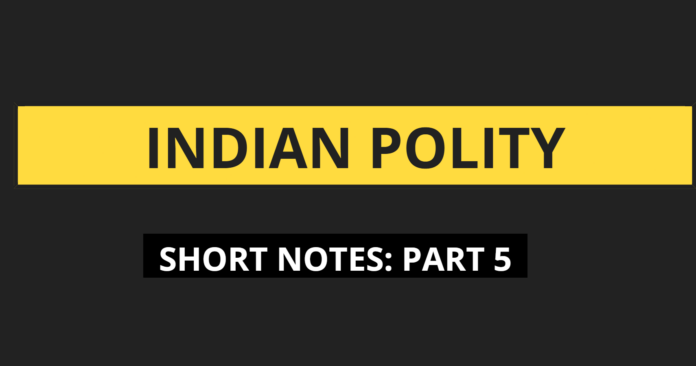Union and State Public Service Commissions
- Constitution provides a Public Service Commission for the Union and each state, or a Joint Public Service Commission for a group of states.
- Appointment by the President for the Union or Joint Commission, and by the Governor for the State Commission.
- At least half of the members should be civil servants with 10 years experience in central or state services.
- Age of retirement: UPSC – 65 years, State or Joint Commission – 62 years.
Elections (Article 324-329)
- Election Commission vested with superintendence, direction, and control of elections.
- Single electoral roll for every constituency.
- No discrimination based on race, religion, caste, or sex for inclusion in electoral rolls.
- Elections based on adult suffrage for citizens aged 18 and above.
- Registration of Political Parties Act, 1951 governs registration with Election Commission.
Political Parties:
- 8 National Parties in India: BJP, Congress, BSP, NCP, CPI, CPM, Trinamool Congress, and National People’s Party.
- Criteria for recognition as a National or State party based on vote percentage and seats won.
- Election petitions for President and Vice-President filed with the Supreme Court.
Various Commissions
Election Commission:
- Autonomous, quasi-judiciary constitutional body established under Article 324.
- Established on 25th January, 1950. First Chief Election Commissioner: Sukumar Sen.
Planning Commission:
- Established in March, 1950. Replaced by NITI Aayog.
- Aimed at involving states in economic policy-making.
NITI Aayog:
- Policy think-tank of Union Government, replacing Planning Commission.
- Aims to involve states in economic policy-making.
- Headed by Prime Minister.
National Development Council (NDC):
- Formed in 1952 to review national plans and associate states in formulation.
- Chaired by the Prime Minister.
- Proposed for abolition since the establishment of NITI Aayog.
Finance Commission:
- Quasi-judicial body constituted every fifth year under Article 280.
- Recommends on the distribution of taxes between center and states.
- 15th Finance Commission chaired by NK Singh, appointed on 2nd January, 2017.
e-GOVERNANCE
- Definition: Technology-driven governance, integrating technology in both governing and being governed.
- Perspective: Utilizes technology for efficient governance and citizen engagement.
Basic Models:
- G2C: Government to Citizens
- G2B: Government to Business
- G2E: Government to Employees
- G2G: Government to Governments
- C2G: Citizens to Governments
National e-Governance Plan (NeGP):
- Integrates e-governance initiatives into a collective vision.
- Takes a holistic view of e-governance initiatives across the country.
Impacts:
- Makes government offices work smartly.
- Makes services available to citizens through the internet.
Successful Projects:
- Railways Reservation System
- MCA 21: Ministry of Corporate Affairs
- Bhoomi Project: Andhra Pradesh
E-districts:
- Mission mode under e-governance.
- Objective: Computerization of services.
- Programs in states like Madhya Pradesh, Andhra Pradesh, Karnataka, Kerala, and Haryana.





